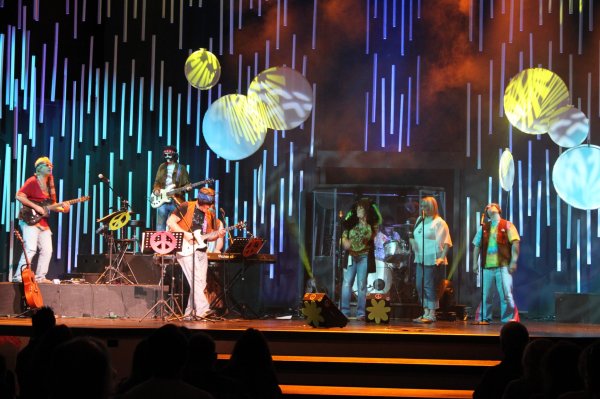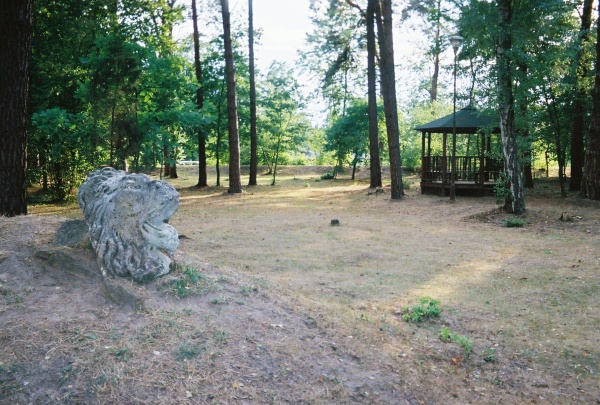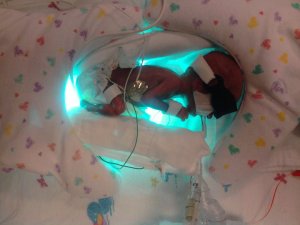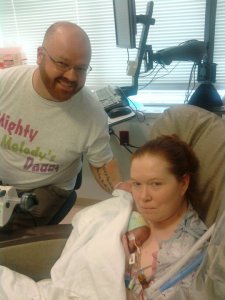A Brief Lesson On ||: Music History :||
Last month the Washington Post published Why My Guitar Gently Weeps, an article by Goeff Edgers, subtitled “The slow, secret death of the six-string electric. And why you should care.” I caught wind of it (possibly crying Mary) via The Fretboard Journal’s Facebook post. Edgers draws attention to declining sales of electric guitars and quotes George Gruhn, founder of Gruhn’s Guitars in Nashville, Tennessee:
“There are more makers now than ever before in the history of the instrument, but the market is not growing. I’m not all doomsday, but this — this is not sustainable.”
The article stirred a bittersweet harmony of emotions. Fondness and disappointment traded the melody like Paul and John on A Day In the Life. “I read the news today, oh boy…“
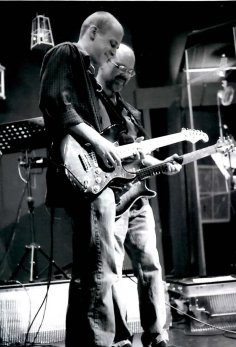
On stage with my son, summer 2014.
I first picked up the guitar around 1969 or ‘70. My son is now a player in his own right and playing beside him is one of the greatest joys of fatherhood. When I shared the article in an email he wrote back, “I’m glad you raised me to think that guitar is cool, because it is.”
So is the electric guitar on life support? If is it only mostly dead, is there a modern-day Miracle Max who can bring it back to life? Is the electric guitar our only hope of rescuing the Princess Bride (contemporary pop music) from the Prince HumperDMX drum machine and the six-fingered DJ Count Rugen?
Or would we be more merciful to call in hospice and allow this “abomination” (according to Andre Segovia) to pass in peace?
Less than 24 hours after reading the Post article I was en route to Iowa to celebrate my 40th high school reunion. In preparation for the five-hour drive I had downloaded a couple dozen podcasts of Freakonomics Radio. Side note: people who refuse to listen to Freakonomics Radio are unfortunately doomed to be labeled as idiots. I’m not just saying. Trevor Noah just says so, too. But I digress…
The March 22 broadcast, How Safe Is Your Job, immediately caught my attention by shining a spotlight on what economists refer to as “creative destruction,” whereby new industries and jobs replace old ones. It opens with a story from the late 19th and early 20th centuries, when the piano ruled over home entertainment. This period of prosperity led to an increase in disposable income, and many Americans purchased new pianos. Hundreds of piano makers sprang up. At its peak in 1905, the industry produced 400,000 instruments. Having a piano in your living room, and a friend or family member who could play it, was a means of cultural status.
Around 1915 the phonograph started to catch on. Now you could have music in your living room at a fraction of the price of a piano (and besides, piano practice is hard!). “In 1914, piano sales totaled $56 million. That was more than double the sales of phonographs…. Five years later, sales of record players hit $158 million. Radio soon eclipsed that. By World War I, pianos were no longer an essential element of every living room.”
The Great Depression drove yet another nail into the piano’s coffin. (Freakonomics sidenote: following WWII, the Steinway piano company took to manufacturing caskets to shore up declining revenues. “Talk about a dying industry.” Ba-dum-tis.) Piano sales continued their decline in the decades that followed. In 2013 only about 32,000 pianos were manufactured.
Is the electric guitar doomed to follow in Steinway’s footsteps?
If so, would it be all that bad?
Linkin Park’s Brad Delson doesn’t think so, according to the Post article. “Music is music,” he says. “These guys are all musical heroes, whatever cool instrument they play. And today, they’re gravitating toward programming beats on an Ableton. I don’t think that’s any less creative than playing bass. I’m open to the evolution as it unfolds. Musical genius is musical genius. It just takes different forms.”
When George Gruhn opened his guitar store in the early 1970s, young players were inspired by the likes of Eric Clapton, Jeff Beck, Jimi Hendrix, Carlos Santana, and Jimmy Page. As these icons step aside, Gruhn is concerned that there are no up-and-comers to fill the void.
“What we need is guitar heroes,” he says. “You don’t see a bunch of kids emulating John Mayer and listening to him and wanting to pick up a guitar because of him.”
I’m sure Mr. Gruhn knows what he’s talking about. But my guitar heroes weren’t the virtuosos. They were John Lennon, George Harrison, Keith Richards. Good players, but not gods. And they weren’t just electric players. Much of the Beatles’ and Stones’ music features the acoustic guitar quite prominently. John Denver was another early influencer, along with Glenn Frey and, of course, Elvis. They all made guitar look cool because, as my son said, it is.
However. Cool is in the eye of the beholder. Today’s youth do not need guitar heroes. Like Delson says, they need musical heroes. Fifty years ago, musical heroes just happened to play guitar. A hundred years ago, they were playing piano. Then technology disrupted the keyboard; now it is disrupting the fingerboard. Creative destruction strikes again. There is nothing new under the sun.
The heyday of the electric guitar may have come and gone, but it’s not dead yet. Neither is the piano. Rather than bemoan the decline, let’s take heart in humanity’s resilience. The radio and phonograph may have unseated the will to practice and perform on piano. But fifty years later, that same technology cultivated a whole new crop of creativity.
Who knows what’s next? Whatever it is, even if I cannot comprehend the harvest, I hope I can summon the strength to applaud.
Let your vision set your goals
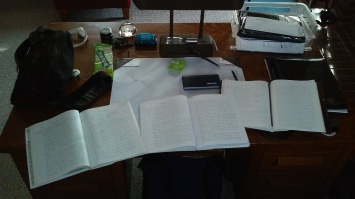 In 2001 I began to cultivate the habit of keeping a journal. Five years later I thought it might be worthwhile to go back and read past journal entries. Each year since then I have devoted the month between Thanksgiving and Christmas to reading the past year’s reflections. It can be a bit depressing when I face the brutal truth that I have made no progress at all in some areas, that the inner conflict I was wrestling with in February remains unresolved at the end of the year. But it is quite uplifting as I see concrete documentation of growth in areas that matter.
In 2001 I began to cultivate the habit of keeping a journal. Five years later I thought it might be worthwhile to go back and read past journal entries. Each year since then I have devoted the month between Thanksgiving and Christmas to reading the past year’s reflections. It can be a bit depressing when I face the brutal truth that I have made no progress at all in some areas, that the inner conflict I was wrestling with in February remains unresolved at the end of the year. But it is quite uplifting as I see concrete documentation of growth in areas that matter.
If one thing stands out from reflecting on 2014, it is the value of vision, that is, the act or power of anticipating that which will or may come to be. Goals can be of value as well, but I am reluctant to set goals, based on my early career experience. As a radio ad salesman I was required to turn in 90 day sales goals at the beginning of every month. It was never enough for the sales manager, so he would set the goal for me. I never achieved it. Not once. Later, as a fundraiser for a small, private university, I would submit annual fundraising projections based on the last year’s results and what I believed to be a reasonable, challenging increase. That, too, was never sufficient. The president and vice president would convene behind closed doors, then hand me the revised fundraising goal. It was not based on past results and well-calculated projections. It was based on the difference between projected earned income (tuition) and projected operating expenses. “Fill the gap, Richard.” In six years at the university I never once achieved my fundraising goal.
I recognize the value of having a goal as a target to aim for. “Shoot for the moon,” the management gurus tell you, “even if you miss, you’ll land among the stars.” But that’s not how I felt as an ad man or a professional fundraiser. I felt like a failure.
My experience with vision is much more positive. It wasn’t long after seeing the Beatles perform on the Ed Sullivan Show in 1964 that I began to envision myself on stage, playing guitar and singing with other musicians. The vision was realized when I played and sang in a rock band for my junior high talent show. It took ten years, and we sucked, but it didn’t matter. I found something I could do that fueled my passion, and I’m still at it today.
In 1996, my wife Tracy and I moved from Dubuque to Kansas City. Our daughter, Xandra, was four years old; our son, Philip, was not quite one. Tracy and I envisioned a church where we could invest our passion for the arts to draw people closer to God. It took us a year to find what we were looking for in the form of a start-up church that was leasing space on Sundays from the local community center. Shoal Creek Community Church had been “planted” about two years earlier, and was committed to using contemporary music and short drama sketches to highlight the spiritual message. In those days, there were sometimes more people involved on stage than there were in the auditorium seats. But the pastor and his wife had a vision for reaching spiritual seekers who were turned off by the traditional church setting. Their vision was in sync with our vision, and we poured ourselves into it. Today Shoal Creek’s weekend attendance often exceeds 1,000 people.
When my son, Philip, was five or six years old, sitting in a car seat was a major pet peeve. But he loved listening to the church band play, especially when we covered classic rock songs. I remember sitting beside him one Sunday as we made final preparations for the service. “Dad,” he said to me, “when I’m a teenager can I sit in the front seat with you, AND can I come to band practice with you?” Much like my experience watching the Beatles — and at about the same age — Philip could envision himself playing in a band. He picked up the bass guitar in middle school, and at 13 he successfully auditioned for the church band. He and I have been playing together ever since.
About the same time my son began to play bass, my daughter envisioned herself serving overseas. When one of her teachers announced plans for a summer trip to Tanzania, Xandra was one of the first to sign up. Unfortunately, the Tanzania experience proved to be cost-prohibitive, so they began to consider alternatives. Fortunately, our church had for several years been engaged in outreach to AIDS orphans in South Africa. A young couple from Shoal Creek was living in South Africa at the time and offered to be “guides” for the student trip. Xandra and her classmates spent 10 days with them in the summer before her senior year of high school. But the experience did not fulfill her vision. It fueled it. As a college student, South Africa was her first choice for a study-overseas experience, and her vision expanded far beyond the six-week internship offered by her university. She reached out to a youth ministry, applied for an intern position, and interviewed with their leadership. Everything was set for a six month stint, six months ahead of time.
Not long after Xandra had finalized these plans she learned that the youth ministry was in less-than-stable condition. Things might turn around by the time she arrived, but it was also possible that the organization could cease to function. She was quite uncertain about what to do. Her sense of responsibility said she should stick with the organization; they were counting on her. But the reality was that she could end up with no place to serve. Upon reflection, Xandra realized her vision was not to serve that organization, it was to be of service to the youth of South Africa. She could still realize her vision, but she needed to adjust her strategy. So she sought advice from worthy 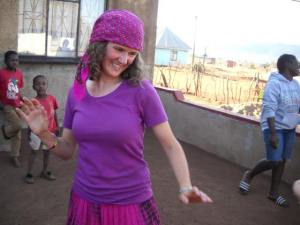 counselors who helped her find another internship opportunity. She worked hard to earn and raise the resources to fund the experience. In May 2013 she arrived in Cape Town and stayed for six months. In that time she touched the lives of hundreds of young South Africans. Vision realized; dream come true.
counselors who helped her find another internship opportunity. She worked hard to earn and raise the resources to fund the experience. In May 2013 she arrived in Cape Town and stayed for six months. In that time she touched the lives of hundreds of young South Africans. Vision realized; dream come true.
Last year was a big year for my son. Philip had dreamed of being a Marine since he was 12 years old. He entered the early enlistment program in August 2013 and got good and serious about physical training to prepare for boot camp. In May 2014 he began to experience pain in his lower leg. Pushing through the pain only made it worse; a visit to the doctor confirmed that tendonitis had set in. The Marine recruiter decided to delay Philip’s entry into boot camp. Although he was disappointed, Philip carefully followed instructions to rest, ice his leg, and accelerate the healing. On July 21 he left for Camp Pendleton, just two weeks later than originally planned. But the path toward his vision was filled with obstacles. Less than a month into boot camp, in a letter he (fortunately) never sent, he wrote:
Dear Mom, Dad, and Xandra,
I have pneumonia and I’m very afraid I’m going to be dropped to another platoon. This means I’ll graduate later. Please tell our church community and ask them to pray for me. This place is terrible. I’ve been IT’d (incentive training) multiple times. Look them up on Google and you’ll get a basic idea. The idea of being dropped is very real and so scary. One recruit I know of is for sure getting dropped, which only worries me more. I miss home so much, and the thought of having to stay here longer is awful to think about. Anyway I hope all is well for you. Please keep praying for me. Also I know you’ve probably replied to my letters but we haven’t…
And that’s where the letter ends. Not long after writing it he recovered and began receiving our letters. In the weeks that followed he went through another bout of tendonitis, numerous “ITs,” and the Crucible, but he never got dropped. Our family was were there, along with my sister, our mother, and a couple of very good friends, to see him graduate in October. Completing boot camp was “the hardest thing I’ve ever done,” Philip says. I envy him. The experience has granted my son an air of confidence and maturity of faith that I never had at his age. Vision realized; dream come true. If he can make it through USMC boot camp, he can accomplish just about anything he wants to.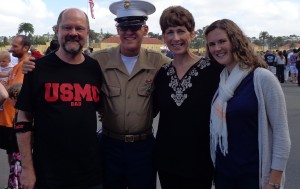
When vision intersects with passion, amazing things happen; but if you don’t cultivate your passions, you might miss out. As a new father, I came close to concluding that it was time to put the guitar aside. I mistakenly thought guitar was a young man’s folly, unless you got lucky like Keith Richards (guitarist and founding member of the Rolling Stones). Real men put their toys aside. When we were on the hunt that led to Shoal Creek Community Church, my vision was less about playing guitar and more about being part of a church community that leveraged the arts to reach people and draw them closer to God. Apparently God had other things in mind. When I contacted the Shoal Creek music director, he told me he was looking for a “plug and play” guitarist who could fit a variety of musical styles. In 25 plus years as a guitarist I had played acoustic, electric, classical, rock and roll, country, jazz, bluegrass, folk, even musical theater. Jack of all genres, I passed the audition.Three years later, the music director was gone and I took over on a volunteer basis. After five years I happily handed the reins to a very talented young woman who has taken the music program to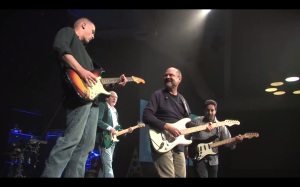 new levels of professionalism. She values me as much more than a guitar player; I am one of her trusted advisors. But I am also the principle guitarist. They call me the Grampa of the music team.
new levels of professionalism. She values me as much more than a guitar player; I am one of her trusted advisors. But I am also the principle guitarist. They call me the Grampa of the music team.
Vision realized; dream come true. And when God is truly smiling down on us, I get to play me some rock and roll.
Despite my distaste for setting goals, I admit they have played an important role in each of these stories. But when your vision is clear, in sync with your passions, and part of a purpose larger than yourself, the goals become obvious. They set themselves and are naturally accomplished as you pursue the vision. My New Year’s Resolution is to keep that in mind as I move through 2015, and I invite you to join me.
The Fast
Joy To The World
Two or three times a month I have a BLAST playing guitar at Shoal Creek Community Church. Last summer we covered the Who, Janis Joplin, Blood Sweat & Tears, Jimi Hendrix, and more in a celebration of the music of my generation. Best of all, my son, Philip, played in the band with me. I was in heaven.
But sometimes I wonder, is this legitimate? I mean, we invest a lot of time, energy, and money in our Sunday services. Are we reaching people? Are we making a difference?
Last week I read Jennie’s story. She and her husband were searching for answers to spiritual questions, and found what they were looking for at Shoal Creek on Christmas Eve 2010. Their story, and others like it, remind me that what we do on Sundays and special holidays is totally worth it. It’s okay to have fun at church. In fact, if you aren’t having fun at your church, there is probably something wrong! God meant for us to be joyful. That’s why we sign Joy To The World at this time of year. Christmas is a celebration of how God became human so that His joy might be in us, and that our joy might be made full (see John 15:11).
Jenny has graciously agreed to share her story here:
Christmas Eve 2010
Growing up, Kenny and I had very different “church” experiences. Kenny faithfully attended with his family every Sunday until he left for college. Although, it was more like a location for an obligatory appointment. God did not receive much mention except for that weekly hour. For me, church always left me wanting more. I learned to distrust the institution of “church” during my parent’s divorce in early childhood. My family became unwelcomed by our home church, and my grandparent’s church made me feel like an outsider from a broken home. Because of this, the majority of my life has been spent avoiding the church.
Though Kenny and I were both spiritual, religion was not a part of our relationship with each other. We talked about God while dating, and knew that we wanted to pursue our faith, but we had so many questions. It was overwhelming and intimidating, so we just lowered the priority and went on with our lives on our own. We married in a small non-denominational ceremony, officiated by an ordained lawyer in a campus chapel. It painted the perfect picture of where we were spiritually – we wanted God in our lives, but weren’t sure how He would fit in, so we included him just enough that we weren’t intentionally leaving him out.
Our marriage was always good, but there was element of our relationship that felt empty. It wasn’t until the birth of our daughter Kyla that we began discussing God, and his role in our lives, again. The topic of Kyla’s baptism created a lot of stress in our relationship, primarily due to family expectations. God wasn’t a major player in our lives, so we felt it hypocritical to have a ceremony that symbolized otherwise for her. Additionally, we didn’t belong to a church, and I wasn’t even baptized myself. Ultimately, we followed our hearts and decided to do what was right for us, not our families, and not pursue her baptism. And again, the topics of God and church were pushed aside.
As we approached our first holiday season as a family, it became increasingly apparent that we wanted, and needed, something more. We felt very isolated and alone. While Kenny coped by throwing himself even more into his work, I secretly began church shopping, online. I longed for a community of friends and a place to explore my faith. We didn’t know many people in the area, and didn’t know anyone here who attended a church regularly. I had noticed Shoal Creek before, by driving by, but hadn’t paid much attention. When I found the Shoal Creek website, it was a different story. I liked what I read, and I wanted to learn more. So, I began watching the services online, and I was captivated. I couldn’t wait to share my discovery with Kenny, but he was skeptical. Understandably so. But, it re-introduced a dialogue of religion and faith.
I craved for more out of Christmas for our family. I wanted it to be more than just the presents, the food, the sleeping in (which let’s face it, as new parents was impossible anyways). I wanted to celebrate the true meaning of Christmas, but wasn’t even sure what that was. We figured that going to church on Christmas Eve was a good tradition to start. If we didn’t like it, we wouldn’t have to go back. There wasn’t anything to lose. And besides, our daughter had an adorable party dress that wouldn’t have gotten worn otherwise! I still remember our nerves as we got ourselves ready for church that evening. We obsessed over what to wear, worried about being judged for being too dressy or too casual. We over-packed the diaper bag full of distractions for our baby girl, anticipating that she would become restless from a long, drawn out and boring service. The drive to church that night was a long one. Five minutes felt like eternity. So many “what if’s” went through our heads, primarily negative ones. It took a lot to get us to the point of trying church together, and we really wanted a positive outcome.
We walked in to the auditorium and took a seat toward the back, probably much like the other once per year attendees. I remember looking around and seeing all of the kids playing in the aisles before the service, and the interactions between many young families. So many smiles. And I wanted that for my own. As the lights dimmed and the music started we quickly realized that this was a church unlike any we could have imagined. We were blown away from the very first song. All of those preconceptions of a Christmas service were quickly changed. We felt welcomed, we were wanted. The people sharing their stories were so real, relatable. The message that night spoke to me personally in such a relevant way. Tears flowed down my cheeks as I listened to church members being so honest. We weren’t alone. God was with us. My husband held my hand tight. And for the first time in a very long time, I prayed. I asked God to please impact my husband’s heart as He was influencing mine. On our drive home, with my eyes still full of tears and overcome with emotion, I asked Kenny if we could please come back to Shoal Creek. There was no hesitation in his answer.
With that beginning, Shoal Creek has become our home. We never expected to get out of a church what we have gotten from Shoal. We not only found a place to worship, but a community of people who have completely changed our lives. We have started a spiritual journey together and it is incredible. We are learning, growing, and evolving. God has become a major player in everything we do. We still have a lot of questions, but we are in an environment that makes it okay. This journey is an exciting one, and it is amazing that it all started with the simple desire to start a Christmas Eve tradition.
Jennie and Kenny
Here is a video of the 2010 Christmas Eve Service that Jennie wrote about: http://vimeo.com/18164973
If you live in the Kansas City metro and are looking for a place to explore the meaning of Christmas, please join us at Shoal Creek Community Church – December 22 and 23 at 7pm, and December 24 at 5pm, 7pm, & 10pm. If you live outside the metro, you can watch live and previous services here: http://www.shoalcreek.org/video?albumId=266357&videoId=33169719.
Merry Christmas!
PS If you have a similar story, please share it in the comments below.
My Gutsy Story
The road to redeeming your purpose cannot coexist with the path of least resistance. Last week I worked up the nerve to enter @gutsyliving’s My Gutsy Story contest, where blogger Sonia Marsh is recognizing one mini-memoir (1000 words or fewer) each Monday. I whittled this story down to the maximum, and am surprised and honored that Sonia chose to feature it as today’s guest post.
Please visit Sonia’s Gutsy Living web site, read My Gutsy Story, and record your reaction in the comments section. At the end of the month, Sonia will ask readers to vote on their favorite Gutsy Story, and the winner has the choice of a number of awards, including advice and counsel on getting your story published. I can use all the help I can get!
Thanks for reading!
The Found Gift
One of our family’s Christmas traditions is to draw names to give a “found” gift to another family member. The rules are simple: you can’t spend any money on the gift, it has to be something you found or made; and you must write a note describing the significance of the gift for that member of the family. Last year I drew my daughter’s name, and I gave her the key to the house that I grew up in at 2210 Rainbow Drive in Cedar Falls, Iowa. (My parents sold the house four years ago, so I had no reason to keep the key anymore.) Here is the letter I wrote to go along with the key.
December 24, 2010
Dear Xandra,
It is still hard to believe that you are 18 years old, a legal adult. You can leave home any time, do whatever you want, and there is nothing your mother and I can do to stop you. But you know what? That doesn’t scare me one bit. You have demonstrated time and time again that you are a responsible young woman. God has indeed begun a good work in you, and I know beyond the shadow of a doubt that He will be faithful to complete it. One of my greatest joys in life is that I get to play the role of your earthly father in the good story you are living.
In his book, A Million Miles In A Thousand Years, Don Miller defines “story” as a character who wants something and overcomes conflict to get it. No conflict, no story; or at best, a boring story. Jon Franklin, in Writing For Story, provides a simple model for a story outline: complication, development, and resolution. The way an author weaves those threads together is what engages the reader in a good story. Your story is already exciting, not because of the conflicts you have encountered (like an upset stomach the day you left for South Africa, or a looming PEO scholarship deadline at Thanksgiving), but because of the confidence and persistence you have applied toward finding resolution.
As you go off to college and from there to life on your own, you will encounter numerous conflicts. Life is complicated, and your faith will be tested when resolution is vague and uncertain. When those times come, you’ll need a reminder that there is hope. Perhaps my found gift for you will serve that purpose. It is my key to 2210 Rainbow Drive. I haven’t lived there for almost 30 years, and even though I can no longer return – in a physical sense – it still feels like home. It reminds me that our heavenly Father has reserved a place for us in His eternal home, that one day all the complications of this world will be completely resolved, and we will forever experience the happy ending for which we were created.
My primary role as your earthly father is to point you toward the heavenly Father, and to encourage you to return to Him daily. Sometimes you’ll feel very close to God, as close together as you and I were the night before last, when you rested your head on my shoulder as we watched the video of the Christmas Eve service. That moment, I think, was a foreshadow of eternity. But there will also be times when God seems far away, completely detached and disinterested. Kind of like when you come home from school with something on your mind and I’m busy working on the computer. But you know that I love you, and that God loves you infinitely more than I do. Keep this key close at hand. May it remind you of my love and God’s love; may it offer hope in seemingly hopeless situations; may it give you strength to persist in pursuit of the happy ending.
The role I play as your earthly father will diminish in the coming years. Someday I’ll exit the stage completely but, God willing, I’ll always be watching from the wings. May this key also remind you to return to your earthly home for a visit now and then. I love you so much, Xannie. You make me so proud to be your dad. Listen… do you hear what I hear? It’s an echo from the future as God welcomes you into His eternal home: “Well done, sweetheart. Well done.”
Love,
Daddy
Do you have a favorite family holiday tradition? Please feel free to share it in the comments.
Black Friday, Cyber Monday, and Memoir
I love memoir. I love reading it, because 9 times out of 10 it’s a story of someone working to redeem their purpose. I love writing it, because it is one way in which I redeem my purpose.
 Last month, Shirley Showalter of 100memoirs.com invited me to write a guest post, a review of singer-songwriter Rodney Crowell’s memoir, Chinaberry Sidewalks. You can read the review here, and I encourage you to poke around Shirley’s blog. If you like memoir, you’ll love her site. If you aren’t familiar with memoir, it’s a great place to learn more about the genre.
Last month, Shirley Showalter of 100memoirs.com invited me to write a guest post, a review of singer-songwriter Rodney Crowell’s memoir, Chinaberry Sidewalks. You can read the review here, and I encourage you to poke around Shirley’s blog. If you like memoir, you’ll love her site. If you aren’t familiar with memoir, it’s a great place to learn more about the genre.
My favorite memoirist, Mary Karr, posted this video yesterday on her facebook page. It’s all about philanthropy (love of humanity), which is what this season is all about. If you are feeling hungover from Black Friday and/or cyber Monday, this could be the cure you’re looking for. Best wishes for a blessed holiday season!
<p><a href=”http://vimeo.com/30556886″>%5BAC%5D Promo 2011</a> from <a href=”http://vimeo.com/adventconspiracy”>Advent Conspiracy</a> on <a href=”http://vimeo.com”>Vimeo</a>.</p>One Crazy-Looking Puzzle
The following is taken from an interview conducted on 9/27/2011. The Unger’s story reminds me that courage is not the absence of fear, but the presence of faith. A link to the recorded interview is provided below.
The path to parenthood has not been typical for Lois and Kaleb Unger. Their first baby, Daniel, was stillborn in May 2010.
“We had to deal with this overwhelming grief that no one should have to feel, and we had to do it together,” Lois says. “There were times we did a lot of drinking together to get past it, a lot of crying together, a lot of just curling up into a ball. I think because we had to do it together, that provided us with a look at God’s plan for us, what people could do for us, and we had to put our pride aside.”
God worked through friends to help them cope with their grief. “He put people in our way, to ask us questions and bother us… in a nice way!” Lois remembers.
“Putting those people in our faces allowed us to see that we could tell the story, and heal that way, too,” Kaleb adds. “It showed us — and others — that God DOES work, even through the horrific times of life.”
By November Lois had a clean bill of health. In January she was pregnant again, but the joy was short-lived. On March 3 her grandmother passed away; then her father died on March 15. Two months later, the unthinkable happened.
“It was like a flashback,” Lois says. She called Kaleb as she drove to the hospital.
“Oh, crap, we can’t do this again!” he said.
“You don’t have to tell me that!”
The doctor confirmed that Lois was having another placental abruption, complicated by preeclampsia. Her blood pressure was 215 over 110. Kaleb’s prayers alternated between, “God, please don’t take them both!” and “Really? This again? Are You kidding me?”
Melody Unger was born on May 21, 2011. Ten inches, 13 ounces (“a king-sized bag of M&Ms”), and 17 weeks premature. The medical professionals didn’t want to offer false hope; they had never intubated a baby that small. But Melody surprised them as she responded to medication, fought for life, and earned the Mighty moniker.
Each hurdle they cleared was followed by another. Lois’s blood pressure was out of control. Her heart was pumping less than half the normal capacity. Then her kidneys shut down. As Melody struggled in the NICU, Lois received daily dialysis treatments. She had to resign from her job and apply for long term disability. Kaleb quickly burned through vacation and sick leave. Insurance covered most of the medical expenses, but the 45 minute commute to the hospital took its toll on their budget and their automobiles. Kaleb lay awake at night praying, “God, we’re just feeble human beings, how are we going to do this?”
God used people to fill the gap with gas cards and car repairs. A friend set up the Mighty Melody Facebook page. Another put together an online site for donations. One day the Ungers wondered how they would pay the mortgage, and the next day, “BOOM! There it was.”
“I have a pride issue,” Lois admits. “I realized the need to set that aside and say to somebody, anybody, ‘Hey, this is what we’re going to need,’ or ‘This is coming up, what do you think I should do?’”
The journey has forever altered their perception of God. “He’s BIG!” Lois exclaims, eyes bright and wide. “Beyond belief,” Kaleb adds. Melody’s Facebook page has nearly 1100 fans. People the Ungers have never met tell them, “Your story has increased my faith.”
“It’s all because one person says something to somebody else, somebody has a picture posted in their office, somebody says, ‘I don’t have much to give, but I can donate breast milk,’” Lois says. “If we didn’t have the faith, we wouldn’t be able to see how all the pieces have started to fit together and just make for one really crazy-looking puzzle!”
Melody was released on October 3. Lois could be on dialysis for months, maybe longer. The Unger home has become an extension of the NICU, spic and span from top to bottom, gloves, masks, hand sanitizer, the works. Trust is the shelter that has drawn them closer to God — and each other.
“Now we need to trust God to take care of us as a family unit at home,” Kaleb says, “and help us be the best parents we can be for this little girl.”
“And the best thing you can do for your children [beyond trusting God],” Lois prophesies, “is to show love for your spouse.”
[Author’s note: You can “like” Mighty Melody on Facebook: http://www.facebook.com/mightymelodyunger. (Too bad FB doesn’t have a “love” button!) For readers who would like to hear “the rest of the story,” a podcast of the full, 50-minute interview is available to download from http://potteronpurpose.podomatic.com/entry/2011-09-28T13_20_19-07_00.]
Stirred, Not Shaken
 Last week I was on a business trip, asking myself why I was still sitting on the fence with regard to mycareer transition. As I sat and prayed I recorded these words from Psalm 15 in my journal: “LORD, who may dwell in Your sanctuary? Who may live on Your holy hill? He whose walk is blameless and who does what is righteous…. He who does these things will never be shaken.” The scripture passage didn’t answer my question or fix my problem, but it stirred my spirit and gave me the courage I needed to move forward. At least for that day.
Last week I was on a business trip, asking myself why I was still sitting on the fence with regard to mycareer transition. As I sat and prayed I recorded these words from Psalm 15 in my journal: “LORD, who may dwell in Your sanctuary? Who may live on Your holy hill? He whose walk is blameless and who does what is righteous…. He who does these things will never be shaken.” The scripture passage didn’t answer my question or fix my problem, but it stirred my spirit and gave me the courage I needed to move forward. At least for that day.
Even though I crossed the line of faith in 1978, it took me over twenty years to get serious about the Bible. One December morning in 2003 I was particularly moved by the first verse of the Gospel of John: “In the beginning was the Word, and the Word was with God, and the Word was God.” The author proclaims – or rather, God proclaims through John – that Jesus is the Word of God. Scripture is also the Word of God, I thought, and I had one of those AH-HA! moments of very nearly grasping a very difficult concept. Then the moment was gone, but the memory stuck. I stopped treating the Bible like just another book, and a mysterious thing happened. A dialogue opened up between God and me.
In the last decade I have read through the Bible two or three times and recorded reflections in twenty-some journals. I don’t read scripture every day, but the habit is deeply embedded in my weekly routine. Right now I’m going through Psalms, a book of poems written long before Jesus walked the earth. Many of them are attributed to David, whom God describes as a man after His own heart. Through these verses David poured out his heart to God, sometimes in anguish, sometimes in praise. In the Psalms he recorded both defeats and triumphs as he transitioned from shepherd to king of Israel.
My transition pales in comparison. Nevertheless, it’s a risky career move that trades the promise of a guaranteed salary for the uncertainty of performance-based commissions. A couple of days after my business trip I was sitting back on that fence, when I picked up my Bible and read these words in Psalm 16:
I will praise the LORD, who counsels me;
even at night my heart instructs me.
I have set the LORD always before me.
Because He is at my right hand,
I will not be shaken.
Twice, in back-to-back Psalms, God has stirred my spirit. He doesn’t take away the fear; He gives me courage to move forward in the face of fear. He doesn’t guarantee that things will turn out exactly as I want; He promises that my faith will not be shaken.
He doesn’t ignore me in silence.
He speaks to me through His Word.
A Change of Art
What follows are the opening paragraphs of the memoir I mentioned in a previous post. Hope to add more next week. ~Richard
Traffic was light as the late-summer sun set on the Pacific Coast Highway. I was driving south and west from Ventura to Long Beach, stereo cranked, and feeling really good about myself. In less than two weeks, Tracy and I would celebrate our 12th anniversary. For eight months I had been consistently reading Scripture and writing reflections in a journal, a habit I had long wanted to cultivate. For two weeks I had stayed faithful to a diet and exercise regimen that would ultimately shed 20 pounds from my 5 foot 7 inch frame. In addition, I was beating the odds in my career. The average tenure of a professional fundraiser is three years. I had been with American Humanics for almost five, after completing six years at the University of Dubuque. But my sense of well-being was most influenced by the role I played as volunteer leader of my church’s music program.
It was hard to believe I had awakened in Kansas City that morning; even harder to believe that my plane had arrived on time in Los Angeles. After renting a car I had driven to Malibu to meet with a marketing professor at Pepperdine University; she had just taken over the school’s nonprofit management program. Next I drove to Ventura to meet with the CEO of the Boys & Girls Club. He had graduated from the Missouri Valley College Humanics program in the early 1970s. Both meetings had gone well.
The rental agency had been out of compact cars, so I had been upgraded to a Chrysler LHS with a premium car stereo. When Hillsong’s The Power of Your Love came on I pulled off the highway to watch the waves and listen.
Lord I come to You
Let my heart be changed renewed
Flowing from the grace that I found in You
Lord I’ve come to know
The weaknesses I see in me
Will be stripped away
By the power of Your love
The power of God’s love, continually flowing, sometimes soft and gentle, sometimes wild and crashing. Just like the waves reduce jagged rocks to soft sand, God’s love just keeps on coming, rolling over me, smoothing away my weaknesses, transforming me into the man I want to be, the man God created me to be. Again and again and again.
I closed my eyes and remembered the events of the last year that had drawn me toward Him; the fears and insecurities that had held me down.
Hold me close
Let Your love surround me
Bring me near
Draw me to Your side
And as I wait
I’ll rise up like the eagle
And I will soar with You
Your Spirit leads me on
By the power of Your love
The waves just keep coming. They never end.
God’s love just keeps flowing over me. It never ends.
After maybe half an hour I pulled back onto the highway and drove to my hotel. It had been a good day, a productive day all the way around. It was turning out to be a really good year.
The good vibrations continued in the morning. Still stuck on Midwest time, I woke with plenty of time to read Scripture, write reflections, and walk the treadmill. After a quick shower I was ready for breakfast. As I stepped on the elevator, a solitary occupant acknowledged me with a frown.
“Can you believe what’s happened?” he asked.
“I don’t know – I’ve been working out.” I was tempted to add, And reading my Bible – what have you been doing? Instead I asked, “What’s going on?”
He stared at me with bloodshot eyes. The elevator doors opened and he walked out, shaking his head. How rude, I thought, and followed him into the lobby. Several people were gathered around a television on which I saw – for the first of many times that day – a Boeing 727 crashing into the World Trade Tower in New York City.
The next several hours passed in a slow-motion haze. My first appointment was at California State University – Long Beach, but the agenda was completely disregarded. CNN was tuned in on a large screen in the auditorium; newscasters speculated that there could be other planes targeting additional national landmarks. All air traffic was grounded. It could be days, even weeks before commercial airlines were running again. Suddenly I was desperate to get home. I called to reserve a rental car, then called my wife.
“You’re going to drive 1500 miles all by yourself?” Tracy asked. “I don’t like that idea at all.”
“I agree, it’s a long drive, but I can’t just sit here in California. Who knows when I’ll be able to fly home?”
“Why can’t you stay with your sister?”
Although Kay lived only 30 minutes from Long Beach, I had dismissed the idea of calling her. I didn’t like giving up control. I wanted to see my family again, right now.
A year earlier we had been on vacation just a few miles from where I now slumped. Our hotel was a short walk from “the happiest place on earth.” Our daughter Alexandra was 8 years old; our son Philip was 4. Tracy and I were putting them to bed when the phone rang.
“Richard, this is Roy,” said my pastor. “Are you sitting down?”
“I am now.”
As I sank to the bed, Roy explained that earlier in the day the church music director had confessed to an affair and resigned from his position. Given that Tracy and I would be standing in endless Disney-lines the following day, he asked that we take advantage of the time to discuss an opportunity. Would I consider taking over as leader of the music team?
“It would be on a volunteer basis,” he added. “We really can’t afford to pay you.”
“Sure,” I said, wondering where the music director’s salary had gone. “We’ll talk about it. But I think you should explain what’s going on to Tracy.” Philip idolized the music director’s five-year-old son, and this was no time to draw either of our kids into the story. It would be hard enough for them to sleep with Disneyland on their minds. I handed the phone to Tracy and felt the weight of the request settle on my shoulders.
Tracy and I had joined Shoal Creek Community Church in 1997, just two years after Roy had established it. By 2000 Sunday attendance was hovering around 150. The music director was very popular – a key factor in the church’s growth. He could play multiple instruments, sing like Paul McCartney, and compose songs with as little effort as it took me to compose a shopping list. I played rhythm guitar on the music team two or three Sundays a month and occasionally added background vocals. I had no experience leading a music ministry, and I didn’t see how it could be done in addition to my full-time job. But what if…?
The conversation between Tracy and me stretched far beyond the lines at Disneyland and continued long after we arrived home. Roy had promised to continue paying the former director’s salary to his wife while he looked for a new job. Roy was also reevaluating the church’s organizational structure. He wasn’t convinced that a full time music director was the best use of resources. He told me that I might be invited to come on staff at some point in the future, but he couldn’t promise.
Despite the uncertainty, the possibility was music to my ears. Tracy heard fingernails on a chalkboard. Her dreams and aspirations did not include the label, “Music Minister’s Wife,” thank you very much. The truth is we both like the things a nice salary affords. But I was blinded by the mirage of playing guitar eight hours a day. It looked a lot more attractive than soliciting contributions for American Humanics.
Lots of kids dream of being rock stars. I have yet to meet someone who dreamt of becoming a professional fundraiser. I had backed into the career, almost by accident.
In college I waffled between the schools of music and business, ultimately graduating with a business degree. Over the next three years I trudged through the muck of retail management and radio advertising sales. In 1985 I was hired by the National Multiple Sclerosis Society to raise money through special events like radio auctions and grade-school “Read-a-thons.” The job lasted seven months. Five subsequent months of unemployment led me to resign from my ego and accept a job as a telemarketer, first selling long distance telephone service, then soliciting alumni for donations to their college or university.
This was no dream job. It was a nightmare. But I had never given much thought to what my own, personal dream job might be. “Rock Star” isn’t a dream job. It’s a pipe dream, and it’s a lot easier to get high on the pipe than it is to work and build the dream.
After six months of paying my dues on the phones, I was promoted to project manager in the telemarketing company’s fundraising division. Most of the sales staff had previous experience as fundraisers in higher education; I was surprised to learn that the work had evolved into a legitimate profession. It wasn’t the most appealing career path, but I could do a lot worse. After four years of managing “tele-fundraising” projects for colleges, public television stations, and other nonprofits, I landed a job as Director of Development for the University of Dubuque, a small, Presbyterian college and seminary in northeast Iowa.
It turned out to have some unexpected perks. In my first month on staff I learned that university employees could attend classes free of charge. I took a master’s level class in business that fall, took another the next semester, and repeated the pattern until, four years later, I had enough credits to receive an MBA.
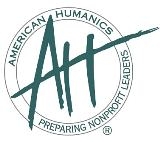 I never got comfortable with the label, “fundraiser.” Apparently I’m not alone – you rarely see that title on a business card. It’s always “Director of Development” or “Vice President for Advancement.” But despite my discomfort, I was pretty good at it and I didn’t know what else to do. A year or so after earning my MBA I began to search for a better-paying job in the field. Xandra was four and Philip was 9 months old when I was named Vice President for Development with American Humanics. It was a national nonprofit dedicated to preparing college students for careers as nonprofit professionals, established in 1948 by a former Boy Scout professional who later served two terms as mayor of Kansas City. We moved there on Christmas Day, 1996.
I never got comfortable with the label, “fundraiser.” Apparently I’m not alone – you rarely see that title on a business card. It’s always “Director of Development” or “Vice President for Advancement.” But despite my discomfort, I was pretty good at it and I didn’t know what else to do. A year or so after earning my MBA I began to search for a better-paying job in the field. Xandra was four and Philip was 9 months old when I was named Vice President for Development with American Humanics. It was a national nonprofit dedicated to preparing college students for careers as nonprofit professionals, established in 1948 by a former Boy Scout professional who later served two terms as mayor of Kansas City. We moved there on Christmas Day, 1996.
Four years later I was ready to move on, and the lure of a full time music gig was impossible to resist. As such, my motivations for accepting Roy’s invitation were far from altruistic. There is always a healthy dose of “What’s in it for me” every time I volunteer. Even if I were to stop and help a stranded motorist, the act would be as much about me as it is about serving someone else. You see, I love to feel good about myself. I love telling others how good I feel about myself even more. Between the words is an attitude that says, “Don’t you wish you could be as selfless and kindhearted as I am?”
There may have been a whiff of nobility in my decision to lead the music team, but it was quickly overwhelmed by the smell of self-centeredness. I had wanted to play in a band since 1964, when I first saw the Beatles on The Ed Sullivan Show. Ten years later the dream touched reality when I played in a junior high school variety show. In high school I altered my driver’s license so I could play in bars, first in a rock band, then in a folk duo. In college I played in a variety of jazz and bluegrass bands, and after college I played in community theatre pit orchestras. But when I got married an inner voice whispered that I should put the guitar aside. It had been fun, but I was a responsible adult now.
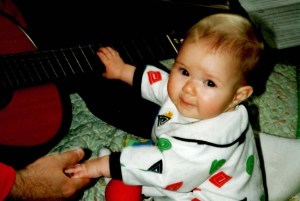 After Xandra was born I would play a song for her once in a while. A couple of times a year I provided special music as they passed the offering plate at Third Presbyterian Church. Then a seminary student at the University turned me on to contemporary Christian musicians like Stephen Curtis Chapman. I realized that rock music was not restricted to secular society, nor was it the exclusive property of single men under 30 with full heads of hair. When we moved to Kansas City, Tracy and I were committed to finding a church where we could express our faith through the arts.
After Xandra was born I would play a song for her once in a while. A couple of times a year I provided special music as they passed the offering plate at Third Presbyterian Church. Then a seminary student at the University turned me on to contemporary Christian musicians like Stephen Curtis Chapman. I realized that rock music was not restricted to secular society, nor was it the exclusive property of single men under 30 with full heads of hair. When we moved to Kansas City, Tracy and I were committed to finding a church where we could express our faith through the arts.
Shoal Creek was all that and more. Not only did the programming include contemporary Christian music, there was no hesitation to drive the message home with contemporary pop music. A song like the Edgar Winter Group’s Free Ride can be very appealing to a spiritual seeker: “The mountains are high, the valleys are low; and you are confused about which way to go.” In the three years I played with the former music director, we covered songs by the Beatles, Boston, the Eagles, and many other favorites from my younger days. On Easter Sunday, 1999, we shared the stage with Kerry Livgren, founding member of the group Kansas and composer of the songs Carry on Wayward Son and Dust In The Wind.
At Shoal Creek I had regular opportunities to play music I loved with talented, like-minded musicians. I could not imagine giving it up ever again. If I didn’t accept Roy’s invitation, who would step forward? What if nobody did and the church fell apart?
Yes, there are stories about people whose curiosity was piqued when the first time they visited Shoal Creek they heard us play a song like The Wallflowers’ One Headlight. They came back a second time just to see if it was a fluke, and some of them stayed. Such stories more than justify playing rock and roll in church. But was that the primary reason I took on the leadership of the music team? Did I do it to serve God and draw people into His family, or did I do it to serve myself?
The truth is the latter. But you know what’s truly amazing? God used me for the former anyway. And when I surrendered to the Truth, the truth ceased to matter.


